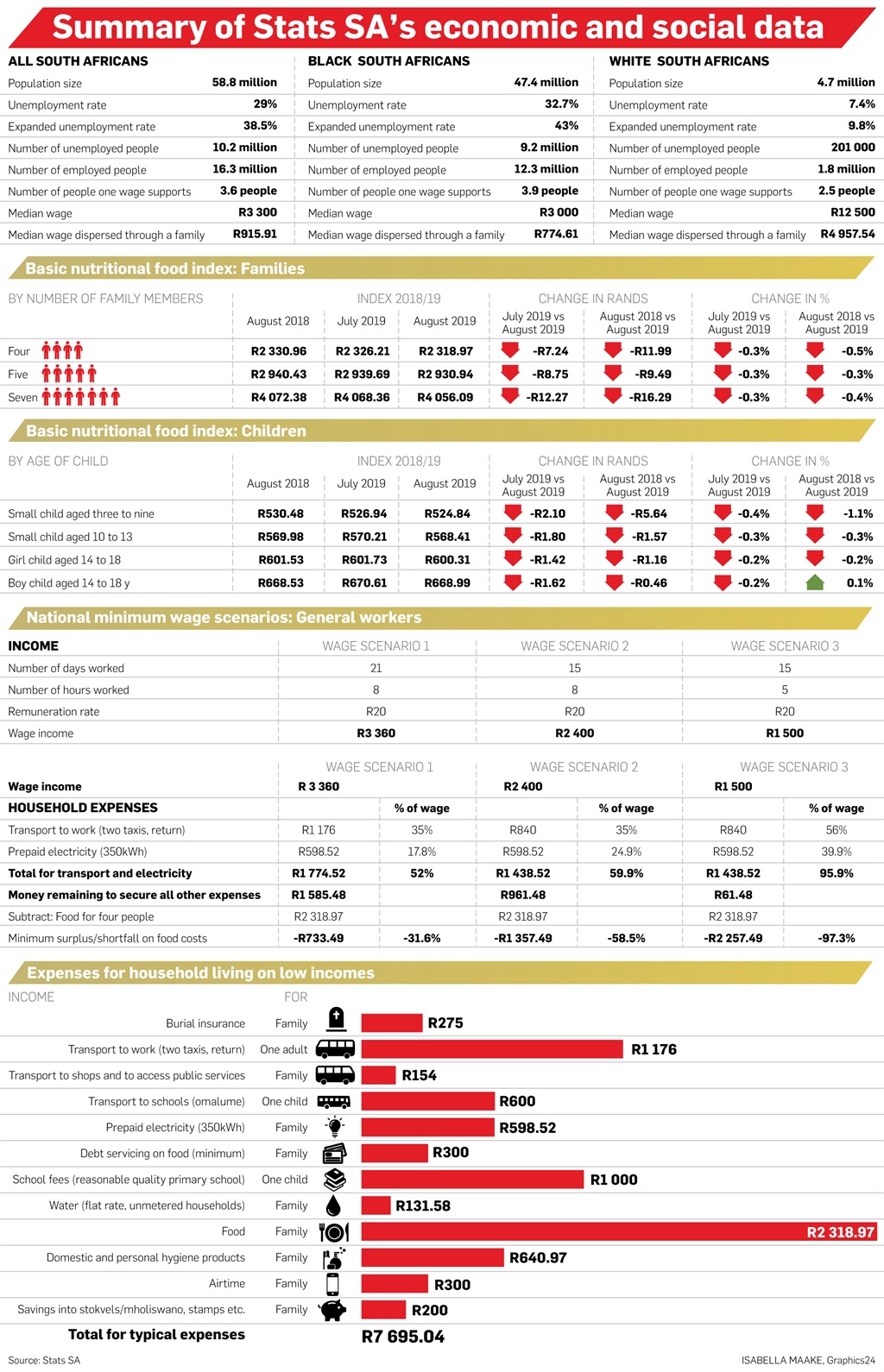
Working class families have resorted to spending at least 24% less on groceries due to increasing electricity and transport costs.
This situation, warns civil organisation Pietermaritzburg Economic Justice & Dignity Group, will worsen among those who are already earning too little and paying too much for essentials.
The country’s future economic growth is also at risk because young children are not getting enough nutritious food, so their growth will be stunted and they will enter the job market as mere labourers.
The dignity group’s Household Affordability Index for last month indicates that transport and electricity gobbled up 58.7% of poor households’ budgets. This figure relates to households with an average monthly income of R3 024.
Transport and electricity are non-negotiable expenses as people must go to work and send their children to school.
Although the group’s research focused on Pietermaritzburg, the outcome mirrors what is happening in the rest of the country, where the high cost of living is putting a tremendous strain on working and middle class families.
Earlier this year, the National Energy Regulator of SA approved a 15.63% average electricity price increase for municipalities, which was implemented on July 1.
To add insult to injury, petrol (93 and 95 octane) increased by 11c per litre this week, while diesel went up by 26c per litre. The price of illuminating paraffin shot up by 24c a litre.
The Pietermaritzburg group’s programme director, Mervyn Abrahams, said that one of the most striking features of the Household Affordability Index was the effect of the recent taxi fare and electricity price hikes on lower-paid workers.
“In Pietermaritzburg, taxi fares increased by about 7.7% and electricity went up by 13.07%. Last month, a low-paid worker in Pietermaritzburg typically spent R1 176 a month on transport and R598.52 on electricity, which equals R1 774.52 a month. These two expenses take up 58.7% of the August national minimum wage [exemption level] of R3 024,” Abrahams said.
“After paying for transport and electricity, workers and their families are left with just R1 249.48 to secure all other essential household expenses. We suspect that the situation in Pietermaritzburg is playing itself out across the country,” he added.
Abrahams said that the cost of a basic nutritional basket of food for a family of four was R2 318.97 a month in August. This means that families had to spend R1 069.49 less on groceries just so they could cover the costs of transport and electricity.
“When it comes to stunted growth, the figure is 30% among boys younger than five and 30% among girls younger than five – a direct result of households cutting back on food. With these new increases, we’re digging a hole. When these children enter the job market in 20 years, they’ll enter as labourers … they won’t be able to participate in the economy,” he said.
This situation is even worse for families surviving on the R420 child support grants. The grant is set at 25% below the food poverty line of R561 per capita per month. According to the Household Affordability Index, it costs R568.41 to feed a child aged between 10 and 13 a basic nutritious diet every month.
Domestic worker Nolwazi Chiya (49) sometimes feels like not going to work because her R3 000 wage does not go far.
After paying her children’s school transport fees and hers she is left with less than R2 000 to last a month.
Chiya, from Mpumuzi near Pietermaritzburg, looks after 11 family members. Her income is supplemented by her mother’s R1 700 old age social grant.
“I spend too much on transport. When I arrive in town, I do not take a connecting taxi to Scottsville suburb where I work because it’s going to leave me with nothing … I walk, with no food to eat during the day at work,” says Chiya, who spends R28 a day on taxi fare.
Then she has to buy groceries and electricity. Her remaining money forces her to buy only basic foodstuff such as mealiemeal, flour, sugar and 5kg of frozen chicken. It’s only two meals with meat in a month.
For cooking, her family must collect firewood because they buy R70 worth of electricity for lights.
“To work or not to work is just the same because I always do not have any money left,” she says.
Chiya says such poverty creates street kids because they often do not get what they want, from healthy food to other important needs.
“This affects your relationship with your children. When they ask you to buy them things, it stresses you and you end up getting cross with them. When you open the fridge where you work it’s full and when you go to your home, it’s empty,” says Chiya.
She believes that low earners such as herself should be able to buy at low prices directly from manufacturers and that social grants should be reviewed. – Sizwe sama Yende
TALK TO US
How will South Africa rise out of the poverty cycle? What must everyone, including government, do to change the lives of those who are suffering?
SMS us on 35697 using the keyword POOR and tell us what you think. Please include your name and province. SMSes cost R1.50. By participating, you agree to receive occasional marketing material




 Publications
Publications
 Partners
Partners









